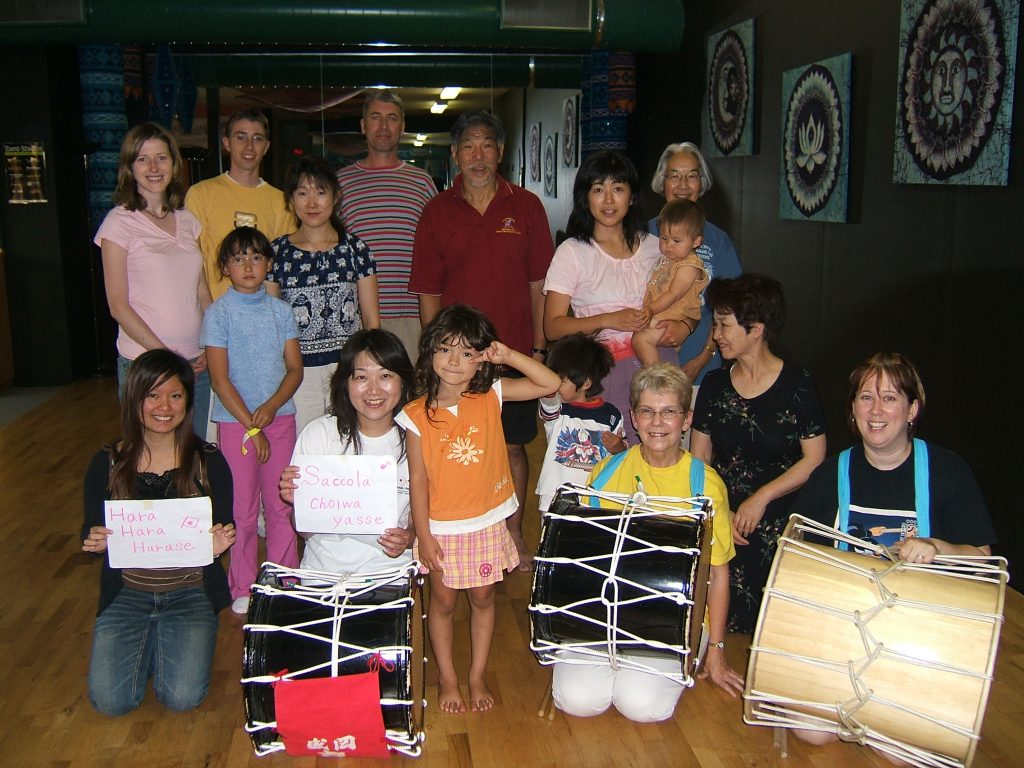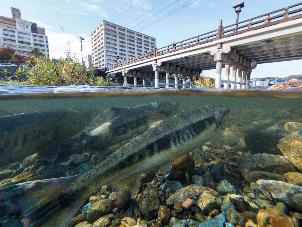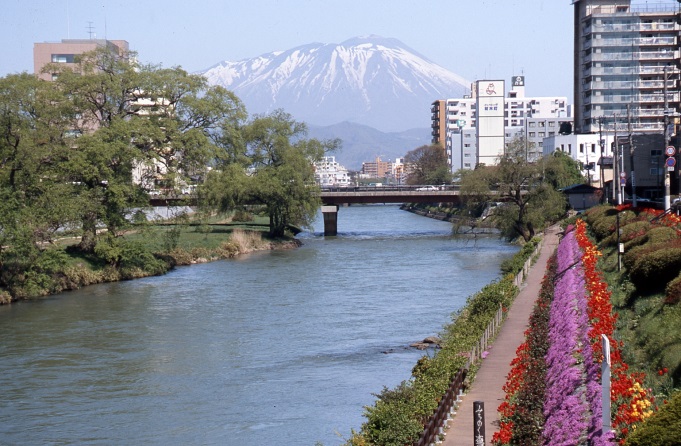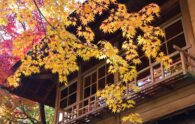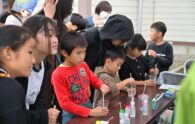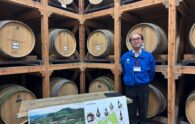Our ILC Relay series interviews people in Iwate who support the ILC project, so our readers can see what Iwate as a whole is doing to bring about the project. This time we’ve interviewed Ms. Yuriko Abe, who has long been involved with international exchange initiatives in Morioka City. (Interviewed by Issei Sugita of Morioka City’s ILC Promotion Office)
Yuriko Abe
What does she do?
Representative of the Hometown Ambassador Kids group, ESL teacher to young children, advisor to exchange students, and intercultural coordinator
Originally from: Kagano, Morioka
Family: Ms. Abe lives with her husband and daughter (4th grade)
Hobbies: Sansa odori dance, piano, tea ceremony, flower-arranging, classical ballet, flamenco
Last year, Ms. Abe joined a Morioka City advisory board to make the city a more international place, set up in preparation for projects like the International Linear Collider. There, she gave a number of very important suggestions on international exchange and multicultural society.
This time, we asked her about her international exchange work and what she likes about Morioka.
Q: What made you interested in working on international exchange initiatives?
“I used to work for a private company, and we once had a trainee come from Brazil. I really enjoyed getting to know them and wanted that kind of experience again. I realized I’d like to experience what it was like to live abroad and be surrounded with different perspectives than my own. I quit my job of 8 years, and went to study English for a half-year in Victoria, Canada.”
Q: That must have been challenging to quit your job and study abroad. What was the impetus behind that?
“I was actually very happy with my job at the time, but then my father passed away, and I started to reevaluate my life. I remembered how I had used to want to try a homestay in a foreign country. I wanted to learn how people abroad structure their time, because I wanted to be able to balance both work and my private life, living in a way that was most natural for me. I think I was searching for how I could be useful to the people around me and society as a whole. My English teacher recommended I go to Victoria, which is the sister city of Morioka. When I went to ask at the Morioka International Relations Association they handed me the business card of the principal of a language school in Victoria. I contacted them immediately, and made the decision to study abroad.”
Q:What else did you do in Victoria besides study English?
“The first time I went to Victoria, I volunteered at events and taught Japanese. The people in my class were from Victoria and other countries from around the world, so we would talk about all of our native food and cultures. We also planned exchange events. I also helped out as a volunteer interpreter when the Rotary Club of Morioka came to Victoria. Seeing these people I had known back in Morioka felt like a gift from my father.
After that, I got very involved with the exchange between Morioka and Victoria, and that has lasted until today. I went back to Victoria again after getting a job at that same language school helping out with student support, counseling, marketing, and being a program monitor. I also volunteered at a day care. As part of my sister city activities, I also attended the 15th and 20th anniversary events, set up a book exchange, showcased Morioka’s Sansa Odori dance, and also took part in flamenco.”
Q:Now that you’re back in Morioka, you’ve continued with international exchange and multiculturalism initiatives.
“I want to repay the kindness of all the people I’ve met in my life thus far, from the people that supported me in Victoria so I could study, to the people who cheered me on in Morioka. I want to use my experience living abroad to help create a society where people from different backgrounds and perspectives come together to shine. That’s why I continue.”
Q:Do you have any other countries you’re interested in?
“I’ve also been involved with an international volunteer group called Jalan Jalan for around twenty years. The group is focused on the world outside of English-speaking countries, so I’ve learned about the cultures of many different countries.
Also, Canada is a country made up of immigrants, with people of all different nationalities living together. In my life in Canada, I made so many friends of different nationalities. It made me aware of Japan’s place in the world, and let me be able to look at it from a more objective standpoint. I learned just how wonderful it is when we respect each other’s differences, help each other, and use our unique qualities to accomplish something that can’t be done alone.”
Q: After you were done studying in Victoria and came back to Japan, what did you do here?
“The language school in Victoria also had an office in Morioka, so I worked there to support others who wanted to go abroad like I did.
Like I said before, I was able to go myself because people helped me, so I ended up going back and forth from Japan to Canada.
Also, I also got to know foreign residents of Morioka who come from many different backgrounds, as I helped them by volunteering as an interpreter or teaching them Japanese culture.
I also worked at the prefectural international association, and volunteered with Jalan Jalan. I was involved with the foundation of the Morioka-Victoria Friendship Association, and helped with their exchange activities along with people who had been supporting the sister city relationship for many years.”
Q:What are you working on right now?
“I’ve long been working in international exchange in a number of different ways: sister city work, town development, career education, gender equality. I’m aiming for the creation of a society where we all respect each other, and where everyone can shine in their own way.
I have two periodic events that I’ve been working on a lot recently. One is something I’ve been doing with three friends since April 2017 called “Global Legacy Kids.” Our main projects are learning about Japanese holidays and history, through presentations in English. We hold these events for Japanese elementary students and their parents, and then we try to invite a foreign resident as a guest.
My whole goal is to get the students to learn more about Japanese culture along with foreign cultures. For example, recently we learned about the Japanese Tanabata holiday (a summer holiday that involves writing down wishes). The Thai language has a unique written form, so we wrote our wishes down on the Tanabata flags and we wrote our names in Thai. In that way, we try to add foreign aspects to Japanese culture.
Another thing I’ve been working on since March 2018 is the Hometown Ambassador Kids group. Through this we reevaluate Japanese culture through an international lens, and increase our understanding of foreign cultures. What makes it different from the Global Legacy Kids group is that foreign students and foreign families experience Japanese culture along with Japanese families. We also focus on introducing content that has to do with everyday life here in Iwate. I started this group for two reasons: I wanted the kids to feel a sense of pride in Morioka which will remain with them as future leaders of Japan, and to become cultural ambassadors of Japanese culture abroad. I also want them to come to the aid the foreign residents around them who need help managing life in Japan with language barriers and the like.
Scenes from the Hometown Ambassador Kids events
Some of the activities we’ve done thus far are making models of Mount Iwate with sushi, making dumplings and going to see the cherry blossoms, making rice balls and traditional Iwate food, and reading the classic story “Omusubi Kororin” in both Japanese and English.
- Can you spot Mount Iwate?
- Sushi rolls made with local foreign residents
The root goal of my activities is this: as the world becomes more and more globalized, we need as Japanese people to have pride in ourselves and wear that on our sleeves as we learn more about the world.”
Q:What do you think we need to do to make Morioka City more multicultural?
“Of course, we need to increase the amount of foreign language signs for foreign visitors, but the people actually living in Morioka are more worried about things like healthcare and how to ride the buses. The prefectural international association holds consultation sessions for people to ask about the law and other big issues, but I think they’re looking for a place where they can just easily ask about smaller, everyday worries.
In order to do that, we need more staff who can speak foreign languages in a number of different situations, and more people who can teach Japanese to foreigners. This means we need more support from the local government for these volunteer activities, and we need more volunteers.
Compared to the past, there are more opportunities to interact with foreign culture, but often it’s foreign people showcasing their own culture, and there’s not a lot of Japanese who communicate our culture to foreign people.
We need to create opportunities for long-term foreign residents to experience not just our language, culture, and history, but also day-to-day life, in order to make their lives in Iwate richer. If we hold enough of these events, a community will form between Japanese people and foreign people, and they’ll be able to easily talk about any worries if they have them. I would be very happy if I could support people in this way.”
Q:What do you hope for the ILC?
“From my position, I think that the ILC will make Iwate a place that can train and develop people who can act on an international stage. If we walk a mile in the shoes of the foreign researchers, and think about what they need for a good life in Iwate, it will be a good opportunity to reevaluate our hometowns and ourselves. Also, since we’ll get to interact with foreign researchers and local people so much more, won’t that be a good impetus to study English?”
Q:What do you like about Morioka?
“There’s a lot I would recommend in Morioka, but I love how there’s two rivers running through town. The Nakatsu River has salmon that swim upstream in the fall, and you can boat downstream in the Shizukuishi river.
I love Mount Iwate too, because it strikes a grand figure that you can see from a number of places in town. Morioka is full of nature even in the middle of the city, and you can feel that richness in your everyday life.
I also love the people of Morioka. There are a lot of very warm and hospitable people here.
I feel invigorated when I look at Mount Iwate, and relaxed and peaceful when I gaze at the flow of the Nakatsu River. I learn from when I can interact with people. It’s only in Morioka where all of those things come together to help me grow as a person.
Our festivals are fabulous, and everyone can join in. A foreign person can arrive and immediately get involved with local cultural events like the Sansa Odori drum festival. Everyone can take part in the Wa dance (circle dance) that happens at the end.
There’s a strong emphasis on passing down our local culture. We have the Three Great Noodles (reimen, jajamen, and wanko soba) and other traditional food, and skilled craftsmen and artisans who make traditional goods. That’s what I love about Morioka.”
Q:In conclusion, do you have any messages for the ILC researchers?
“Everyone, I know your main aim in coming to Iwate will be to do your research, but I hope you’ll have fun meeting people in your neighborhoods, and really get a true feel for what it is to be in Japan. And I’d like you to hold that feeling in your hearts and bring it back to your own country.”
Japanese
ILCリレー⑩安部 由利子さん(ふるさとアンバサダーキッズ代表)
ILCリレーでは,ILC実現のためのオール岩手の取り組みを発信するために、ILCを応援している岩手県民の方々にインタビューしています。今回は、盛岡市で長年国際交流活動に携わっている安部由利子さんにインタビューしました。(聞き手は,盛岡市国際リニアコライダー推進事務局 杉田一盛)
【安部さんのプロフィール】
肩書 ふるさとアンバサダーキッズ代表,児童英語講師,留学アドバイザー,異文化コーディネーター
出身 盛岡市加賀野
家族 夫,小学4年生のお子様1人
趣味 さんさ踊り,ピアノ、茶道,華道,クラシックバレエやフラメンコなどの舞踊
安部さんは,昨年度,盛岡市が設置した「ILC誘致実現を見据えた国際化まちづくりアドバイザリーボード」の委員をお務めいただき,特に国際交流や異文化共生に関する貴重なご意見をいただきました。
今回は,安部さんの国際交流の活動のお話や盛岡の魅力についてお話を伺いました。
Q:安部さんが国際交流活動に興味を持ったきっかけは何ですか?
「勤めていた民間企業で、ブラジルからの研修生を受け入れ、交流したことがきっかけになったと思います。本格的な活動は、海外の日常生活を体験し様々な考え方を学びたいという思いから、8年間務めた会社を退職して,カナダのビクトリア市に半年間語学留学をしたのが始まりです。」
Q:会社を辞めて,留学するということは,なかなか難しくなかったですか。何かきっかけはあったんですか。
「その当時、仕事も充実していて,会社を辞めることは考えていませんでしたが,父が他界し、自分の人生を見つめ直した時、ふと、自分が海外へのホームスティに興味を持っていたことを思い出しました。仕事と私生活を両立して自分らしい人生を生きる、そのために海外の人はどのような時間の使い方をしているのかを学びたい。一人の人間として、社会や周りの人たちの役に立てることは何かを模索していたのだと思います。そして、語学留学するのであれば,帰国してから、大切な故郷やこれまでお世話になった方々に恩返しができるような活動をしたいと強く思うようになりました。そんな時,当時,通っていた英会話教室の先生から,それなら是非盛岡市の姉妹都市であるビクトリア市をと勧められ,盛岡市国際交流協会に行ってみたところ,ビクトリア市の語学学校の校長先生の名刺があり,即連絡し,留学することを決めました。」
【写真】
ビクトリアで校長先生と一緒
Q:留学先のビクトリアでは語学留学の他に,どのような活動をされていましたか。
「最初の語学留学の時は、イベントのボランティアや日本語を教えることもありました。地元の方々や多国籍のクラスの仲間たちと、それぞれの食や文化を紹介し合ったり、交流会を企画したりしていました。通訳ボランティアをして、盛岡からロータリークラブ会員の皆さんが来訪して、面識のある方々と再会したご縁は、父からのプレゼントではないかと感じました。その後、盛岡市とビクトリア市の姉妹都市交流事業に関わり、今につながっています。また、お世話になった語学学校のスタッフとして働く機会をいただき、2度目のビクトリア入りを果たしてからは、留学生のケアやカウンセリングなどのサポート業務,マーケティング、プログラムのモニターなどのお手伝いもしていました。デイケアでボランティアもしました。姉妹都市交流の関係では、15周年、20周年、クロックタワーの除幕式などの記念事業に参列したり、図書交流,さんさ踊りを広める活動やフラメンコなどを通じた交流などもしていました。」
【写真】
図書交流(左)、フラメンコのグループ(右)
Q:戻ってこられて,国際交流や異文化共生の活動に携わっている一番の源は何ですか。
「ビクトリアに留学した時の貴重な体験を支えてくれた人々、地元盛岡で応援してくれた人々、これまで出会った全ての人々へ恩返しをしたいという気持ちが一番の源です。海外生活の経験を生かして、違う文化、考えを持つ人々が、お互いに手を取り合い、一人一人が輝く社会の実現を目指し、活動を続けていきたいと思っています。」
Q:ビクトリア市だけではなく,他の国に興味をもったのはどうしてですか。
「約20年前から続けている「世界と遊ぼう-じゃらんじゃらん」のボランティア活動を通して,世界は英語圏だけではなくて,色々な国や文化があることを改めて認識しました。そして、多くの国の文化を学んできました。
また、カナダは移民を多く受け入れている国で、多国籍の文化が共存しています。カナダでの生活も含め、多国籍の友人たちと交流を重ねていくことによって、世界の中の日本を意識して、自国のことを客観的に見られるようになりました。お互いの違いを尊重して、生かして、助け合い、一人では成し遂げられないようなことを実現していけることの素晴らしさを体験してきたことが、大きいと思います。」
Q:ビクトリア市での留学を終えた後,日本に戻ってこられてからは,どのような活動をされていますか。
「通っていた語学学校の盛岡営業所として、留学希望者のサポートをしていました。
先にお話しましたとおり、現地でのサポートに入ることもありましたので、日本とカナダを行ったり来たりしていました。
また、様々なバックグランドを持つ盛岡在住の外国人の方々の日常に寄り添い、通訳ボランティアや日本のこと学ぶお手伝いもしていました。
県の国際交流協会に勤務してからも,「世界と遊ぼう-じゃらんじゃらん」などのボランティア活動は続けていました。また,姉妹都市交流においては,盛岡ビクトリア友好協会の設立に関わり、長年交流を支えてこられた方々とともに、交流事業のお手伝いを続けていました。」
【写真】
2005年 ビクトリアパレードにて
Q:現在,力をいれて活動していることは何ですか。
「今まで、様々な形で異文化交流、姉妹都市交流事業、街づくり、キャリア教育、男女参画などの事業に関わり、お互いを尊重し合い一人ひとりが輝くことのできる社会の実現を目指してきました。
今、特に力を入れて定期的に開催している活動は、2つあります。一つは平成29年の4月から友人3人と企画している,「グローバルレガシーキッズ」です。主な活動は,日本の行事を歴史とともに学ぶ。それを英語で紹介する。異文化交流もする。さらに,行事にちなんだ創作活動もします。対象は日本人の小学生親子で、各回定員が10組です。異文化紹介は、在住外国人の方をゲストとしてお呼びしています。異文化を学ぶだけではなく,日本の文化へも理解を深めて欲しいという願いで企画しています。
【写真】
“グローバルレガシーキッズ“の様子
例えば,「七夕」を学んだ会では、タイの文字は特徴があるので,短冊に願い事を書くときに,名前はタイ語で書いてみるという具合に、日本文化の中に異文化を取り入れる工夫をしています。
もう一つは,今年の3月から始めた「ふるさとアンバサダーキッズ」です。主な活動は、日本文化を在住外国人と共に学び、参加者それぞれのふるさとと照らし合わせながら、国際的な視点で日本文化を見つめ直し、異文化にも理解を深めることです。「グローバルレガシーキッズ」との違いは,留学生や在住外国人の家族が、日本の家族と一緒に日本文化を体験すること、身近な岩手での日常生活に関わる内容をテーマに盛り込んでいる点です。活動を始めたのは,日本の将来を担っていく子供たちの,ふるさとを誇りに思う気持ちを育み、海外でも日本のことをきちんと伝えられる親善大使に育ってほしいという思いと,在住外国人の生活を支援したいという二つの思いがあったからです。今回の活動を始める前から,在住外国人の方から,個人的に相談を受けることもありましたが,地元の家族や同じ境遇の人々との交流を図ることで、不慣れな日本での生活で困っている悩みを緩和できる居場所としての役割も担っていきたいと思っています。
【写真】
ふるさとアンバサダーキッズのイベントにて
今までの活動では、飾り巻き寿司で岩手山を表現したり、お団子を作ってお花見したり、おにぎりと郷土料理を作り「おむすびころりん」を日・英で読み聞かせて昔話に触れる、など、おもてなし料理から基本的な料理までを、楽しく学びました。
【写真】
岩手山を表現した巻き寿司(左)外国人住民と一緒に巻き寿司をつくっています
活動の根底には、ますますグローバル化が進む時代だからこそ、日本人として誇りを持ち、身に着けておきたい姿勢があると感じます。」
Q:盛岡市が多文化共生を進めるうえで必要なことは何ですか
「インバウンド対応で外国語表記の案内板などを増やすことも大事ですが,盛岡で生活する外国人にとっては,医療や,移動手段のバスの乗り方など普段の生活の中で不安を感じているようです。県の国際交流協会では、相談会を開催していて、法律に関わるような大きな悩みを相談できますが、日ごろ抱えているような子育ての不安を始めちょっとした問題などについて、気楽にお話できる場所が求められていると思います。
そのためにも,様々な場面で外国語を話せる人材や日本語を教える人材が必要になります。多文化共生ができるまち、盛岡の価値を高めていく上で、外国人向けボランティア活動への行政のご支援があると,今よりもボランティアに参加できる人が増えると思います。
また,以前に比べて、異文化に触れる機会は増えていると感じますが、在住外国人の方が異文化を紹介するイベントが多く,外国人の方に日本のことを伝える機会は少ないと感じています。
【写真】
2007年の盛岡さんさ踊りワークショップにて
長く滞在する海外からの家族にとっては,岩手の生活をより豊かにするために、言語だけではなく,文化や歴史,日々の暮らし方など,日本の様々なことを体験する機会を作っていくことが、必要だと感じます。定期的に開催することで,日本人と参加者の間でコミュニティが作られ,普段の生活で困っていることなどの悩みも気軽に語り合えることができると思います。そのような活動を応援していただけたら嬉しいです。
Q:ILCに期待することは何ですか。
「私の立場から申しますと、岩手県が国際的に活躍できる人材が育つ環境となることを期待します。岩手で安心した生活が送れるようにと、海外の研究者の立場に立って考えることは、ふるさとや自分自身も見つめ直す、良い機会にもなることでしょう。また、海外の研究者と地元の人々が身近に接する機会が増えることよって、英語などの言語を学ぶ励みにもなることでしょう。」
【写真】
“グローバルレガシーキッズ”で盛岡の秋祭りについて学びました
Q:安部様がお気に入りの盛岡を教えてください。
「盛岡のお勧めはいっぱいありますが,一つは,鮭が遡上する川(中津川)と川下りも楽しめる雫石川が街の真ん中を流れているところです。
【写真】
鮭が遡上する様子
岩手山も大好きです。岩手山は,我々ふるさとのシンボルの山ですが,街の様々なところから見える雄大な姿に魅かれます。盛岡にはこういった自然を街の中心にいながら,身近に感じられる生活の豊かさがあります。
【写真】
岩手のシンボル“岩手山”
盛岡の人も大好きです。温かくて,おもてなしの心が強く,思いやりの気持ちを持った人が多いと思います。
岩手山を見て元気をもらったり,中津川の流れを見て癒されたり,人と接して学んだり,そういった成長させてくれるすべてが揃っているのが盛岡だと思います。
お祭りも魅力的です。参加型のお祭りである“さんさ踊り”に代表されるように,海外からいらした方々でも,すぐに参加でき,地域文化を体験して感じることができるのも魅力の一つだと思います。
さんさ踊りもそうですが,郷土料理や三大麺などの食、伝統工芸等の技、地域文化がしっかり伝承されていることも盛岡の良いところです。
Q:最後に,ILCの研究者に伝えたいことを教えてください。
「みなさま、研究という使命をもって,日本にいらっしゃると思いますが,居住する地域の人々との交流も楽しんで,“日本”というものを思いっきり感じて、日常生活も楽しんでいただきたいです。そして,それを自国に持ち帰っていただけたら嬉しいです。」


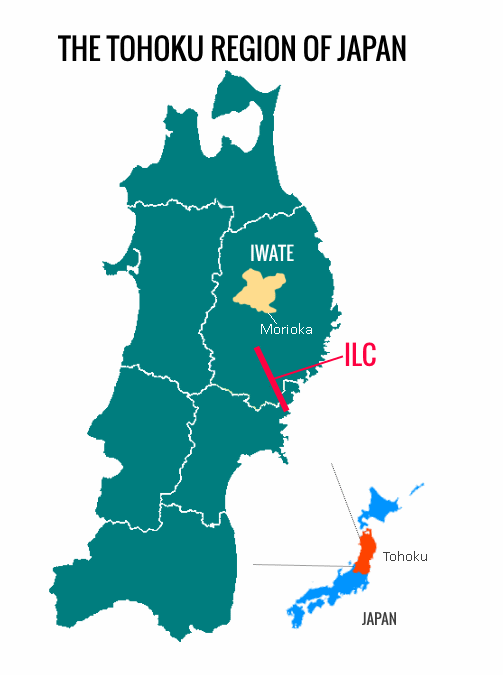
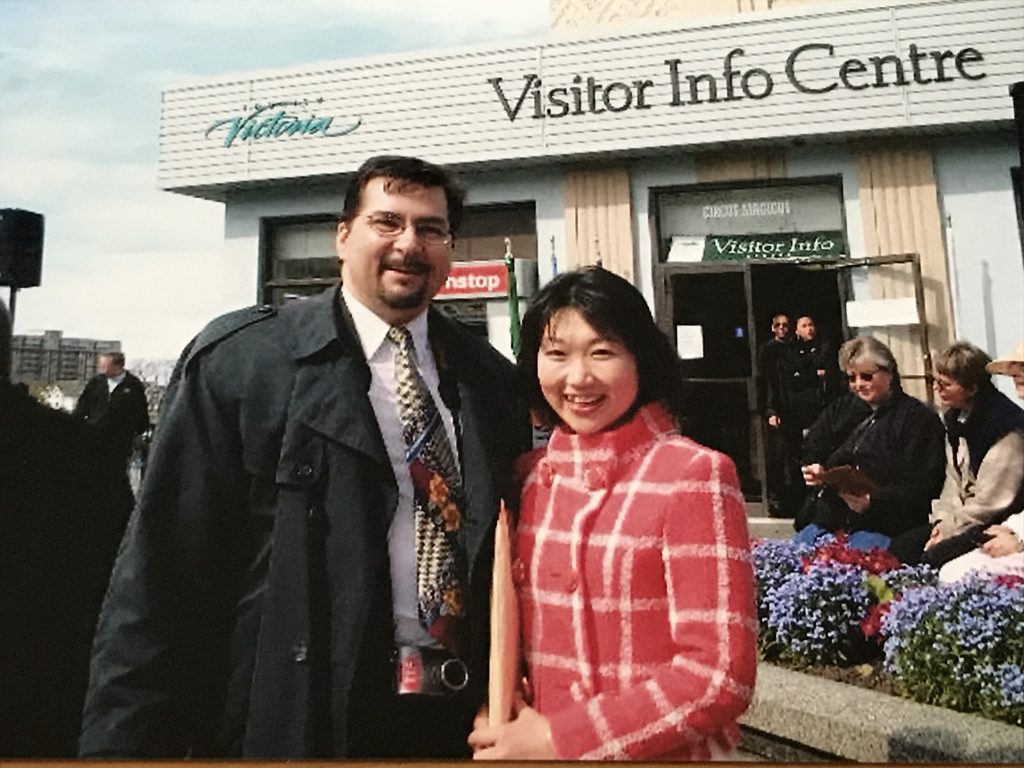


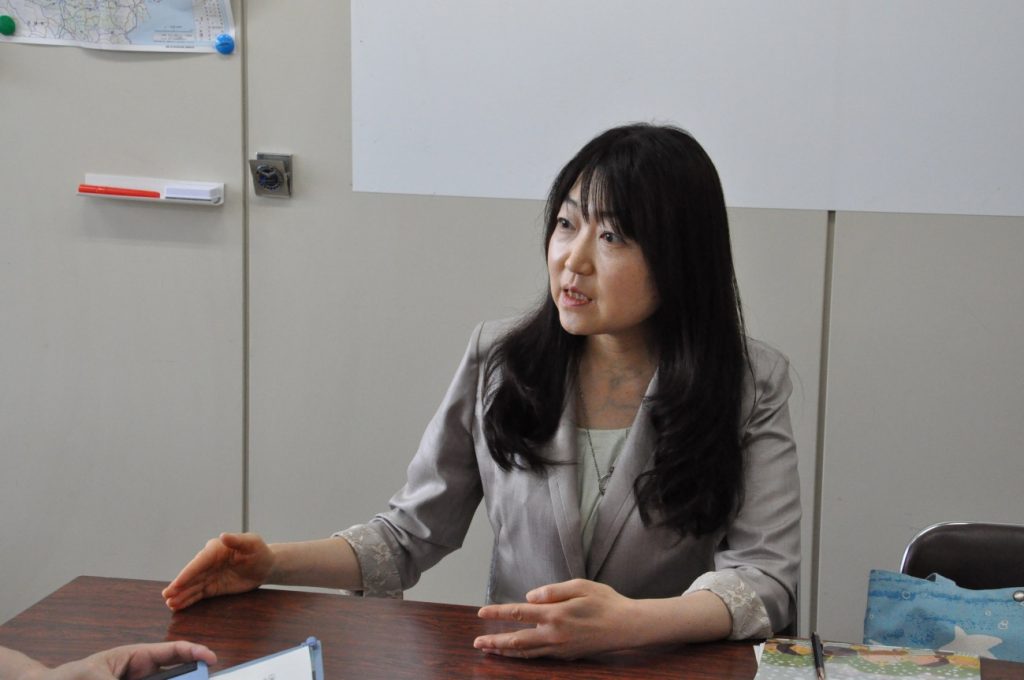


-150x150.jpg)



-169x300.jpg)
